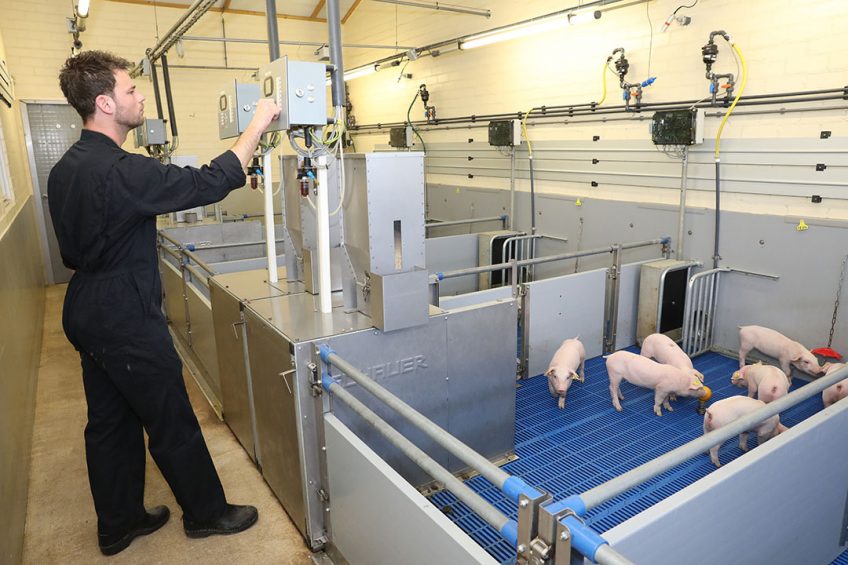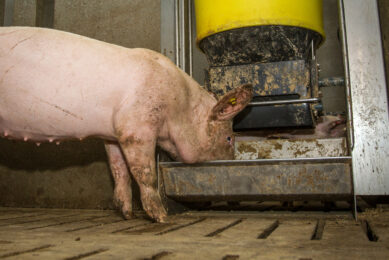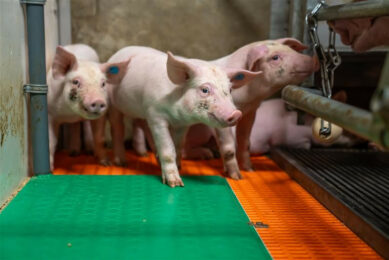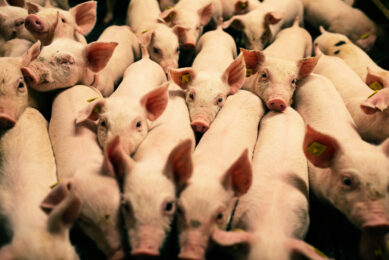These pigs are watched very closely

Several young pigs and calves will have to watch out soon – every step they take will be watched, monitored and interpreted. New ambitious research, coordinated by Trouw Nutrition and several other parties, aims to acquire and interpret millions of data on these young animals, with the eventual aim to enhance sustainability.
The gestating sows at Trouw Nutrition’s Swine Research Facility do not have a reason to complain when it comes to extra’s in their facility. For instance, the group housing is equipped with back scrubbers (originally designed for cattle) and many of them enjoy a scrubbing session. They can also play with hanging skippy balls.
For research facilities often more is possible than on regular farms. Not surprisingly therefore, this facility, near Boxmeer, the Netherlands, is also providing a broad range of advanced monitoring equipment to be able to meticulously measure the animals’ feed and water consumption. Leading to interesting insights being uncovered. Only last year, in the context of a wider research, the group discovered that no sow is the same when it comes to water consumption – from one to the other daily water intake can be very different.
It is exactly this type of knowledge that becomes increasingly available in the world of intensive livestock production. With sensors, algorithms, millions of data can be generated about the animals, their feed, and the indoor climate. To add to that, many companies have recently started investing in the creation of apps for easy use on phones. The result for livestock farmers is a large amount of apps on his phone or tablet and an even larger amount of data. Now how to make that easily accessible and useful?

Ambitious 4 year project
Trouw Nutrition acknowledged that challenge when it embarked on an all-encompassing, ambitious 4 year research project. The company, part of Nutreco, managed to attract a wide variety of companies and universities for the programme ‘LifeStart’, which aims to know ‘as much as possible’ for weaner pigs and dairy calves and make that easily understandable for users.
Marjan Beerthuis, grants and contracts manager at Trouw Nutrition was one of the driving forces for the cooperation. 3 contemporary developments were at the heart of choosing this approach, explains Mrs Beerthuis. “First, the growth of the world population asks for an ever-improving efficiency to produce food. Secondly, more sustainability requires that we need to get more out of an animal, to increase life production. The third reason is that economy of scale on farms leads to less attention for the individual animal. We believe that by investing in this, we can increase both animal health as well as animal welfare.”

Focus on young animals
The research goals will zoom in on young animals, as they are a key focus for Trouw Nutrition anyway. Mrs Beerthuis says, “We are particularly interested in young animals as we believe that is where the foundation is laid for a good and efficient life production. Think of finisher pigs, growing them is less challenging than raising young pigs successfully. That is why it pays off to know more about them.”
Apart from Trouw Nutrition, the research programme involves the Dutch companies Noldus and Sorama and the Netherlands-based academic institutes Radboud UMC and Wageningen University & Research. In total the programme costs € 4 million, of which, part will be covered by European research grants and regional grants from the Dutch Gelderland province.
Each party will have an own part to play within this collaborative research project:
- Trouw Nutrition will focus on welfare-related precision feeding as well as development of nutritional additives with (in vitro) models, data science and behavioural studies to support the health and improve performance.
- Noldus, headquartered in Wageningen, the Netherlands, is specialised in behavioural research and will play an important part in providing sensors and develop the ‘Intelligent Behaviour Research Platform (IBRP)’, where all the data will come together and be made accessible and easily usable.
- Sorama, based in Eindhoven, the Netherlands, has developed a 3-D video camera which is able to capture, distinguish and interpret sounds, their patented technology is enabling the researchers to localise these sounds exactly. The company has a broad experience in applying this technology in many fields, but not in agriculture.
- At Radboud UMC in Nijmegen, the Netherlands, the Donders Institute for Brain, Cognition and Behaviour is a research centre devoted to understanding the mechanistic underpinnings of human cognition and behaviour in health and disease. This university is included in the research project to learn more about the specific relationship between mother animals and their offspring. Zooming in on rats, on a neurological basis – they aim to discover what can influence the behaviour of the young rats and learn on this level.
- Wageningen University & Research is involved to develop models on so-called ‘intestinal organoids’. These are cell cultures of intestinal stem cells which can be used as a model for an entire gut. The models will be used to source effective nutritional additives based on specified characteristics and will lead to fewer pigs being needed for trials.

Research farm
To see what it all led to, a first trial set-up can be viewed in the weaner pig section of the Swine Research Facility: their rooms are full of sensors, buttons, displays and wires – and between 8 and 14 weaner pigs to complement that. Apart from detailed water and feed intake sensors, which can measure intake as well as the time the individual animals take for that, several weaner pens now also have a solid cube installed at the top which contains the hypersensitive 3-D camera for capturing sounds. “We expect roughly 4 to be necessary for the entire section,” Mrs Beerthuis explains.
 In addition, a temperature device is hanging in the middle of the room, as well as a conventional camera. “Should there be any problem detected by e.g. the 3-D device, then we can rewind with the camera and try to establish what might have happened.”
In addition, a temperature device is hanging in the middle of the room, as well as a conventional camera. “Should there be any problem detected by e.g. the 3-D device, then we can rewind with the camera and try to establish what might have happened.”Meanwhile the pigs themselves, which will stay in these compartments from weaning at 23/24 days until 10 weeks of age, don’t notice much of it. One group is chasing after the another, while another is lying together, huddled in a corner.
[A pig consumes feed while its every move is followed. Photo: Henk Riswick]
Results
In 4 years’ time, the cooperating partners hope to know a lot more in detail about weaner pig behaviour and the development of health and welfare related sustainable precision feed and nutritional additives. Even more sensors will be added during the time of the research, the data science teams of Trouw Nutrition, Noldus and Sorama are well equipped to handle large amounts of data which will lead to an enormous increase in knowledge around the effect of nutritional, behavioural and health related interventions – in case useful outcomes are available, these will be communicated, Mrs Beerthuis says. “We aim for a continued increase of sustainability of the lives of production animals. On top, think of having more research data, a lower carbon footprint, lower ammonia emission levels as well as lower manure production levels per kg produced meat or milk.”
Eventually, if all of this comes together, an exciting platform will be created of which the practical application will not only be limited to only the research partners. Mrs Beerthuis says, “It is our goal that eventually also farmers worldwide will be able to benefit from the platform we create.”











